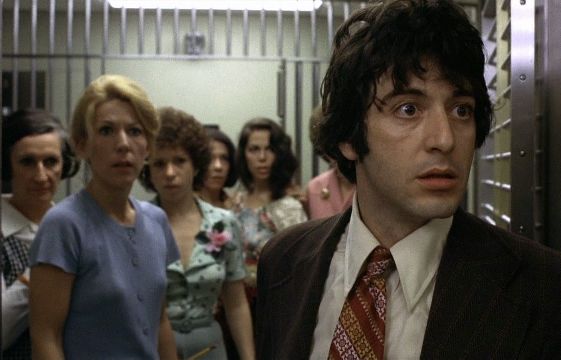Dog Day Afternoon (1975) 
“The robbery should have taken 10 minutes. 4 hours later, the bank was like a circus sideshow. 8 hours later, it was the hottest thing on live T.V. 12 hours later, it was all history. And it’s all true.”

Dog Day Afternoon (1975)
Director: Sidney Lumet
Cast: Al Pacino, John Cazale, Penelope Allen
Synopsis: A man robs a bank to pay for his lover’s operation; it turns into a hostage situation and a media circus.
If Sidney Lumet’s Dog Day Afternoon hadn’t been based on a widely-known (at the time) true story, there’s a fair chance that the creative minds behind it would have had to pitch the movie as a comedy to get it green-lighted. After all, the tale of a pair of bungling bank robbers intent on stealing enough money to pay for the sex change operation of the gay lover of one of them doesn’t sound like promising material for a drama. But reality has a habit of throwing up stories far stranger than any work of fiction, and often colours semi-farcical situations with an element of pathos that reveals the honest emotions at work behind the outlandish premise.
Al Pacino (The Godfather, Heat) is a wired bundle of nervous tics and gestures as Sonny, the inept leader of the gang of two that attempt to rob the Chase Manhattan bank in New York one hot summer afternoon. Brimming with a manic energy reminiscent of a young Jimmy Cagney, Pacino’s character is so far removed from the solemn calmness of Michael Corleone that it’s difficult to believe both characters are played by the same actor. His accomplice, Sal, is played by John Cazale (The Godfather Part II, The Deer Hunter), another refugee from the Godfather movies. Sal’s an ex-con who relies on Sonny to do the thinking for both of them, a passive observer apparently swept up in the slipstream of Sonny’s energy. He’s not too bright, is Sal – he famously thinks Wyoming is another country – but he has a touching faith in Sonny that goes some way to explaining just why he’s tagging along on the other man’s madcap mission.
Seeing Sonny and Sal – and a third accomplice who will quickly bail – sitting in a clapped-out car outside the bank, we sense immediately that the robbery is destined to fail. Sonny is short and nervous; Sal, lean and lugubrious. Together, they look like a second-rate comedy act that’s been peddling the same routine for years. When the robbery goes awry, the hapless duo and their nine hostages find themselves besieged by a small army of policemen led by the brash, but largely ineffectual, Moretti (Charles Durning). They also attract a large crowd of supportive onlookers, and we soon learn that Dog Day Afternoon isn’t about the bank robbery or the plight of the hostages, but the media circus that surrounds the foiled attempt: TV helicopters vie with police choppers for air space above the bank, and Sonny finds himself being interviewed live on TV by a newscaster too naïve to realise that a desperate bank robber is liable to use industrial-strength language. Although Sonny comes across as one of life’s losers, he’s smart enough to play the crowd as he ventures onto the street to negotiate, first with Moretti and then with vaguely sinister FBI Agent Sheldon (James Broderick), and his rallying cry of ‘Attica’ as he strides up and down in front of the bank waving a white handkerchief has become a classic, instantly recognisable, moment from 1970s American cinema.
Dog Day Afternoon provides something of a showcase role for Pacino, and it’s an opportunity he grasps with typical fervour and enthusiasm. Seeing him as he was back then – hungry, driven, living the roles he played – it’s kind of sad to witness the rugged parody of his former self that he’s become in recent years. Although Sonny and Sal are theoretically the bad guys, Frank Pierson’s screenplay – which was largely improvised by the cast – delves deep enough into Sonny’s motives to make him a sympathetic figure whom we quickly realise poses no threat to those he’s holding hostage. He’s a decent guy at heart, driven to desperate measures by his inherent desire to make those he loves happy, and we find it impossible to dislike him even as he starts to revel in the unexpected status of counterculture hero. Cazale, of course, never got the opportunity to fully develop as an actor the way that Pacino did – he died of cancer in 1978 after making just five films – but from his grave, solemn performance here (and his work in The Godfather movies) there’s every reason to believe he would have become one of his generation’s greatest character actors.
Dog Day Afternoon might prove to be difficult viewing for those brought up on a post-Jaws diet of high profile, rapidly-edited movies. Despite its sensational premise, it’s the kind of slow, thoughtful character study that only the independents will invest in these days. It will be a long time – if ever – before we see the majors once more investing in movies like Dog Day Afternoon so, although it’s not without some minor flaws, if it comes your way you should take the opportunity to see it.
(Reviewed 22nd August 2015)
httpv://www.youtube.com/watch?v=CF1rtd8_pxA

